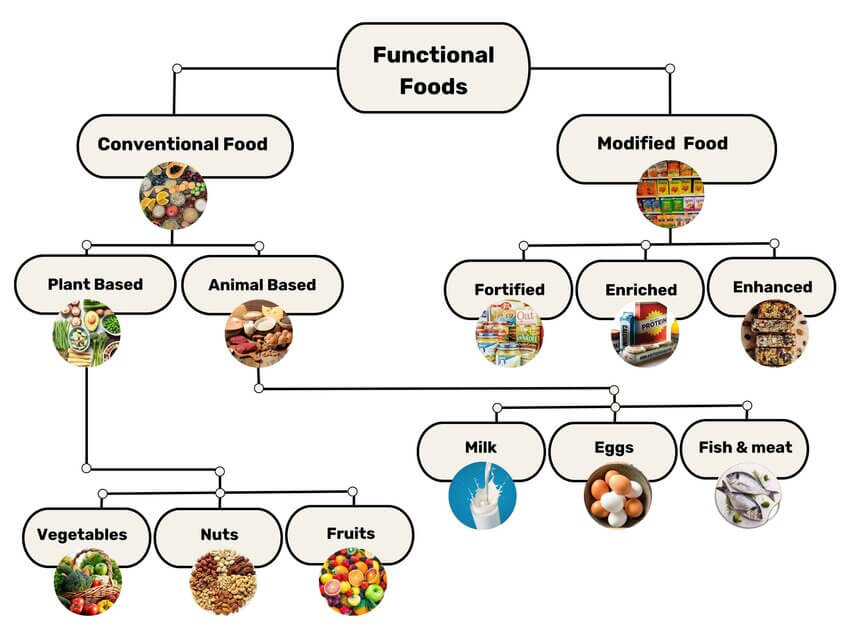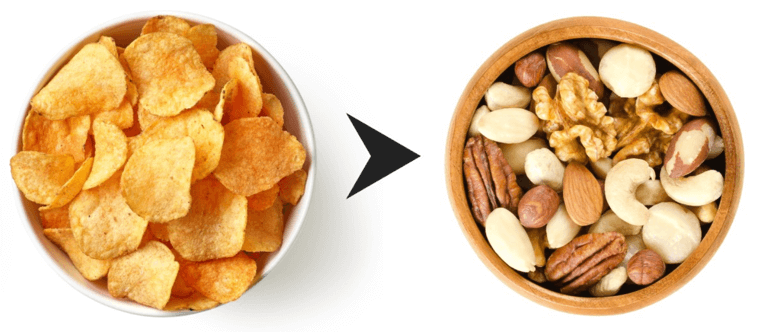

Table of Contents
Functional foods with incredible health benefits are more than just a source of basic nutrition; they offer substantial support for disease prevention and overall well-being.
As Hippocrates famously said, “Let food be thy medicine and medicine be thy food.” This timeless wisdom remains relevant today, as more people become aware of the impact their diet has on their health. Functional foods, a crucial concept in modern nutrition, provide benefits that extend beyond simple nourishment. They are rich in bioactive compounds, vitamins, minerals, and other essential nutrients that promote optimal health and can help prevent or manage chronic conditions like heart disease, diabetes, and cancer.
What are Functional Foods?
Functional foods with incredible health benefits are those that deliver more than just basic nutritional value. These foods contain bioactive compounds that contribute to enhanced bodily functions and overall health. By incorporating them into your diet, you can support various bodily systems and potentially reduce the risk of serious diseases.
Types of Functional Foods
Functional foods can be classified based on their sources, which include plants, animals, and microorganisms, or on the specific health benefits they offer.
| Category | Examples |
|---|---|
| Plant-Based Functional Foods | Fruits and vegetables, Whole grains, Legumes, Nuts and seeds |
| Animal-Based Functional Foods | Fish and seafood, Dairy products, Eggs |
| Microorganism-Based Functional Foods | Fermented foods such as yogurt and kimchi |
Benefits of Functional Foods
Functional foods with incredible health benefits offer essential nutrients such as vitamins, minerals, and antioxidants. Beyond their basic nutritional value, these foods provide a range of health advantages, including:
- Supporting Cardiovascular Health: They help maintain a healthy heart and blood vessels.
- Enhancing Immune Function: They boost the body’s ability to ward off infections and illnesses.
- Improving Gut Health: They support a balanced digestive system and promote overall gut wellness.
- Reducing the Risk of Certain Cancers: They contain compounds that may lower the likelihood of developing cancer.
- Supporting Brain and Metabolic Health: They contribute to cognitive function and metabolic processes, aiding in overall brain and metabolic well-being.

Classification of Functional Foods
Functional foods with incredible health benefits can be categorized into nutrients and non-nutrients, each offering specific advantages for various body systems.
| Category | Examples |
|---|---|
| Nutrients | |
| Lipids | Omega-3 fatty acids, Conjugated linoleic acid |
| Vitamins | Vitamin E, Vitamin C, Folates, Carotene |
| Minerals | Selenium |
| Non-Nutrients | |
| Fibers | Soluble and insoluble fibers |
| Phenolic Compounds | Flavonoids, Tannins, Isoflavones |
| Non-digestible Oligosaccharides | Fructans, Galacto-oligosaccharides |
| Phytosterols | Found in plant oils, help reduce cholesterol levels |
| Glucosinolates | Found in cruciferous vegetables, help reduce cancer risk |
| Carotenoids | Lutein and Lycopene, found in leafy greens and tomatoes |

Sources of Functional Foods
Get an Extra 10% Off – Fill out the Form Below!

Functional foods with incredible health benefits originate from diverse sources, each providing unique bioactive compounds that contribute to overall wellness:
| Functional Foods | Bioactive Compounds |
|---|---|
| Nuts, Seeds, Oils | Vitamin E |
| Fish | Omega-3 fatty acids |
| Legumes | Polyphenols, Anthocyanins |
| Grapes, Red Wine | Flavonols, Myricetin, Quercetin |
| Citrus Fruits, Vegetables | Vitamin C |
| Dark Chocolate | Flavonoids |
| Margarine | Phytosterols |
| Whole Grains | Fiber, Phytochemicals |
| Soy Proteins | Genistein, Daidzein |
| Leafy Vegetables | Carotenoids |
| Onion, Garlic | Quercetin |
| Green and Black Teas | Polyphenols |
| Tomatoes | Lycopene |
| Vegetable Oils | Tocopherols, Tocotrienols |
List of Functional Foods
Functional foods with incredible health benefits are an essential part of a balanced diet, offering more than just basic nutrition. They provide unique bioactive compounds that support various aspects of health and well-being. Here’s a selected list of such foods, each known for their significant health-promoting properties:
1. Fruits
Apples: Rich in pectin and polyphenols. May improve gut health and reduce cholesterol levels.
Pomegranates: Contain punicalagins and anthocyanins. May support cardiovascular health and reduce inflammation.
Bananas: High in potassium and resistant starch. Beneficial for heart health and digestive function.
2. Vegetables
Spinach: Packed with lutein, beta-carotene, and iron. Supports eye health and may lower the risk of age-related macular degeneration.
Kale: Rich in glucosinolates, vitamins A, C, and K. May help reduce cancer risk and contribute to healthy skin.
Sweet Potatoes: Provide beta-carotene and fiber. Support immune function and digestive health.
3. Grains
Quinoa: Contains all nine essential amino acids, fiber, and antioxidants. Supports muscle repair and gut health.
Barley: High in soluble fiber (beta-glucan) and selenium. Assists in lowering cholesterol and boosts immune function.
Amaranth: High in protein, fiber, and essential nutrients like magnesium and phosphorus. Potentially benefits bone health and reduces inflammation.
4. Legumes
Chickpeas: High in fiber, protein, and folate. Encourage heart health and help keep blood sugar levels stable.
Lentils: Contain protein, iron, and fiber. Promotes heart health and helps maintain balanced blood sugar levels.
5. Nuts and Seeds
Flaxseeds: Packed with omega-3 fatty acids, lignans, and fiber. Help reduce inflammation and support heart health.
Chia Seeds: A good source of fiber, omega-3 ALA, and antioxidants. Aid digestion and regulate blood sugar levels.
Pumpkin Seeds: Contain zinc, magnesium, and antioxidants. Support prostate health and improve sleep quality.
6. Oils
Olive Oil: High in monounsaturated fats and polyphenols. Supports heart health and reduces inflammation.
Coconut Oil: Contains medium-chain triglycerides (MCTs). May support metabolism and promote fat loss.
Avocado Oil: Contains monounsaturated fats and vitamin E. Supports skin health and reduces oxidative stress.
7. Dairy
Greek Yogurt: Contains probiotics, calcium, and protein. Supports gut health and bone strength.
Kefir: Rich in probiotics and bioactive peptides. May enhance gut and immune health.
Cheese: High in calcium and conjugated linoleic acid (CLA). Supports bone health and may reduce inflammation.
8. Fish and Seafood
Oysters: Provide zinc, omega-3 fatty acids, and vitamin B12. Support immune function and brain health.
Shrimp: High in protein, selenium, and astaxanthin. May support skin health and reduce oxidative stress.
9. Herbs and Spices
Turmeric: Contains curcumin, a potent anti-inflammatory compound. May reduce arthritis symptoms and improve brain function.
Ginger: Provides gingerol, which may reduce nausea and inflammation.
Cinnamon: Rich in cinnamaldehyde. Supports blood sugar regulation and may have antimicrobial properties.
10. Fermented Foods
Kimchi: Contains probiotics, fiber, and vitamins A and C. Supports gut health and immune function.
Sauerkraut: Rich in probiotics, fiber, and vitamin C. Promotes healthy digestion and boosts immunity.
Miso: Contains probiotics and isoflavones. May support gut health and reduce cancer risk.
11. Beverages
Kombucha: A fermented tea rich in probiotics and antioxidants. May support digestion and boost energy.
Bone Broth: Contains collagen, amino acids, and minerals. Supports joint health and improves skin elasticity.
12. Other Functional Foods
Seaweed: Provides iodine, omega-3s, and antioxidants. Supports thyroid function and reduces oxidative stress.
Mushrooms (e.g., Shiitake, Reishi): Contain beta-glucans and polysaccharides. Boost immune function and may offer anti-cancer benefits.
Honey: Rich in antioxidants and antibacterial compounds. May help soothe sore throats and improve digestive health.
By incorporating these functional foods with incredible health benefits into your diet, you can harness their power to support your overall health and well-being.
How to Include Functional Foods in Your Diet
Incorporating functional foods into your daily diet is simple and effective. Here are a few tips:
- Add more fruits and vegetables to your meals.
- Incorporate a colorful variety of foods to ensure a broad range of nutrients.
- Swap refined grains for whole grains like brown rice, quinoa, or barley to boost fiber intake.
- Include fatty fish in your diet at least twice a week to get the heart-healthy benefits of omega-3 fatty acids.
- Swap processed snacks for nuts and seeds for a healthier option. Almonds, walnuts, and sunflower seeds are great choices.
- Drink green tea or other herbal teas rich in antioxidants to support overall health.

Dietitian’s Desk

Incorporating a wide variety of functional foods with incredible health benefits into your diet is an easy and effective way to support overall health. Each of these foods brings a unique set of bioactive compounds and nutrients that work synergistically to promote optimal well-being. Whether it’s the omega-3s found in fatty fish, the probiotics present in fermented foods, or the antioxidants in fruits and vegetables, these functional foods offer tremendous benefits that go beyond basic nutrition.
As Dt. Anup Agharwal believes,, “Food is not just sustenance; it’s a powerful tool for enhancing our health and longevity. By consciously incorporating functional foods with incredible health benefits into our daily routine, we can lay the groundwork for a healthier life, both physically and mentally.” This perspective aligns with the growing trend of using food as medicine, underscoring that each meal is a chance to nourish both body and mind.
By thoughtfully adding these functional foods into your meals, you can boost your immune system, improve cardiovascular health, enhance gut function, and more—empowering yourself to lead a healthier and more vibrant life.
FAQs
What are functional foods with incredible health benefits?
Functional foods with incredible health benefits are foods that go beyond providing basic nutrition. They are rich in bioactive compounds, vitamins, minerals, and antioxidants that can promote overall well-being and help prevent chronic diseases such as heart disease, diabetes, and cancer.
What are some examples of functional foods?
Examples of functional foods include:
Fruits: Apples, pomegranates, bananas
Vegetables: Spinach, kale, sweet potatoes
Grains: Quinoa, barley, amaranth
Legumes: Chickpeas, lentils
Nuts and Seeds: Flaxseeds, chia seeds, pumpkin seeds
Oils: Olive oil, coconut oil, avocado oil
Dairy: Greek yogurt, kefir, cheese
Fish and Seafood: Oysters, shrimp
Fermented Foods: Kimchi, sauerkraut, miso
Beverages: Kombucha, bone broth
How do functional foods benefit heart health?
Functional foods like fatty fish rich in omega-3 fatty acids, nuts, seeds, and olive oil are known for their heart-protective properties. They help reduce cholesterol levels, lower blood pressure, and decrease inflammation, all of which contribute to improved cardiovascular health.
Can functional foods improve gut health?
Yes, functional foods like yogurt, kefir, and fermented foods such as kimchi and sauerkraut are high in probiotics that promote a healthy balance of gut bacteria. Additionally, foods high in fiber, such as whole grains, legumes, and fruits, support digestive function.
Do functional foods help boost the immune system?
Functional foods rich in antioxidants, vitamins, and minerals, such as citrus fruits, leafy vegetables, and mushrooms, can enhance immune function. Probiotic-rich foods like kefir and yogurt also help strengthen the body’s natural defenses.
How do functional foods aid in cancer prevention?
Certain functional foods, including cruciferous vegetables like kale and broccoli, are rich in compounds like glucosinolates and carotenoids, which have been linked to a reduced risk of cancer. Foods high in antioxidants, such as berries and green tea, also help protect cells from oxidative damage.
Are functional foods beneficial for brain health?
Yes, functional foods like fatty fish (rich in omega-3s), nuts, seeds, and dark chocolate are known to support brain function and protect against cognitive decline. Turmeric, rich in curcumin, has anti-inflammatory properties that may also improve brain health.
How can I incorporate more functional foods into my diet?
Incorporating functional foods is simple:
Add more fruits and vegetables to every meal.
Replace refined grains with whole grains like quinoa and barley.
Include fatty fish like salmon in your diet.
Snack on nuts and seeds instead of processed foods.
Drink antioxidant-rich beverages like green tea.
Can functional foods help with weight management?
Yes, many functional foods like whole grains, legumes, and nuts are high in fiber and protein, which promote satiety and help regulate appetite. Functional foods like green tea and coconut oil may also boost metabolism, aiding in weight management.
Why should I choose functional foods over supplements?
Functional foods offer a natural way to obtain essential nutrients and bioactive compounds. While supplements can provide isolated nutrients, functional foods deliver these nutrients in their natural form, along with additional beneficial compounds like fiber and antioxidants, which work synergistically for better health outcomes.

🎯 10+ years of Experience
🎓 10k+ Trained ( 📍 Jaipur )
💪 Helping change people’s lives
🌿 Most trusted lifestyle counselor
